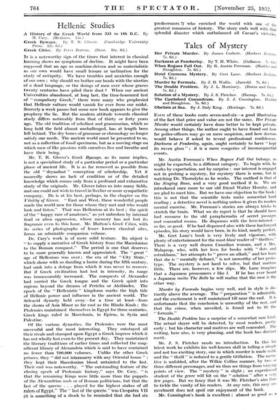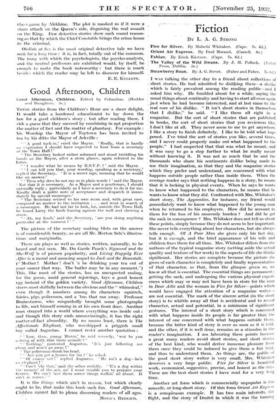Tales of Mystery
Her Private Murder. By James Corbett. (Herbert Jenkilo, Murder by Formula. By .T. H. Wallis. (Jarrold. 7s. 6d.)
ObeLists at Sea. By J. Daly King. (Heritage. 78. 6d.)
EACH of these books costs seven-and-six—a good illustration of the fact that price and value are not the same. Her Private Murder would certainly have done better to be kept private. Among other things, the author ought to have found out how far police-officers may go on mere suspicion, and how doctors would behave if asked to reveal professional confidences. Darkness at Pemberley, again, ought certainly to have "kept its raven gloss " : it is a mere congeries of inconsequential events.
Mr. Austin Freeman's When Rogues Fall Out belongs, as might be expected, to a different category. To begin with, he works by expectation, not by surprise : our interest is engaged not in probing a mystery, for mystery there is none, but in watching Dr. Thorndyke as he works. The method is that of the Singing Bone, and a very good method it is. We are introduced once more to our old friend Walter Hornby, and are glad to meet him. But we have one objection to the book : this is not that the scientific tests make somewhat hard reading ; a detective novel is nothing unless it gives its readers mental exercise. Mr. Freeman's stories are always tricks to stretch the brain. What we do regret is that he should have had recourse to the old paraphernalia of secret passage, and concealed rooms. He dispenses with the love-interest- so far, so good. If he had dispensed also with these hackneyed episodes, his story would have been, in its kind, nearly perfect. Mr. Gret Lane's book is very lively and vigorous, with plenty of entertainment for the most blasé reader of" thrillers:' There is a very well drawn Canadian woman, and a Mrs. Malaprop, who, with her love for books with "dots and astrakhans," her attempts to "prove an alkali," and her fears that she is "mentally defunct," is not unworthy of her proto- type. The mystery is not hard to solve, but that matters little. There are, however, a few slips. Mr. Lane imagines that a Japanese pronounces r like 1. If he has ever heard a Japanese recite The Bells he will realize that the case is the other way.
Murder by Formula begins very well, and in style is dis- tinctly above the average. The " preparation " is admirable, and the excitement is well maintained till near the end. It is unfortunate that the conclusion is unworthy of the rest, and that the crime, when unveiled, is found not to tit the formula."
The Double Problem has a surprise of a somewhat rare kind. The actual slayer will be detected, by most readers, pretty early ; but his character and motives are well concealed. The writing, here also, is very pleasing, and the book has distinct merit.
Mr. J. S. Fletcher needs no introduction. In this his latest work he exhibits his well-known skill in telling a simple and not too exciting story, one in which murder is made mild, and the " thrill " is reduced to a gentle titillation. The narra- tive is unfolded, after the Wilkie Collins manner, by two or three different personages, and we thus see things from varying points of view. The " mystery " is slight ; an experienced student of the genre will hit on the " solution " after a very few pages. But we fancy that it was Mr. Fletcher's aim thuk to tielde the vanity of his readers. At any rate, this easy un- ravelment does not spoil our enjoyment of the book.
Mr. Connington's hook is excellent : almost as good as a
chç s-game by Alekhine. -The plot is masked as if it were a sham attack on the Queen's side, disguising the real assault on the King. Few detective stories show such sound reason- ing:as that by which the Chief Constable brings the crime home to the criminal.
Obelists at Sea is the most original detective tale we have seco for a long time : it is, in fact, totally out of the common. The irony with which the psychologists, the psycho-analysts, and the neutral professors are exhibited would, by itself, be enough to make the book noteworthy : but there is much besides which the reader May be left to discover for himself.
E. E. KELLETr.







































 Previous page
Previous page